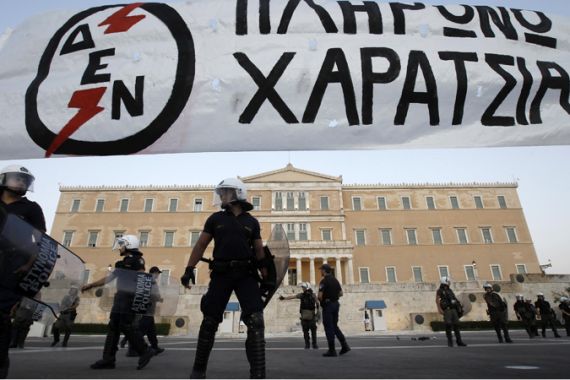Greece battles debt crisis amid fresh strike
Eurozone policymakers debate dramatic new rescue plan, as Athens copes with labour walkout over austerity measures.

A 24-hour transport strike in protest against austerity measures planned by the government is under way in Greece amid last-ditch attempts to save the country from a disastrous debt default.
Suburban rail and tram workers refused to go to work on Monday while buses and trollies stopped operating for several hours in the middle of the day.
Keep reading
list of 4 itemsUS imposes new sanctions on Iran after attack on Israel
A flash flood and a quiet sale highlight India’s Sikkim’s hydro problems
Why is Germany maintaining economic ties with China?
Airline passengers also faced considerable delays as air traffic controllers implemented a work-to-rule action, refusing to work overtime or performing any actions beyond their set shifts.
Transport unions are planning further 48-hour strikes later this week to protest against government plans to put thousands of workers on a heavily docked salary for 12 months before reassessing their status.
Greek police held their own protest, with the Special Guards unit hanging a giant black banner from the top of Lycabettus Hill in the capital reading, “Pay day, day of mourning”.
Faced with mounting anger from the country’s international creditors, the government recently announced a raft of new austerity measures to secure the next $10.7bn installment of bailout loans from a massive rescue package it has been dependent on since last year.
Without the new funds, Greece only has enough funds to see it through mid-October, when it faces the prospect of a messy default.
Implementing reforms
European policymakers, stung by criticism for failing to stem the eurozone debt crisis, have been working on new ways to stop the fallout from Greece’s near-bankruptcy from inflicting more damage on the world economy.
After a weekend of being told by the United States, China and other countries that they must get more aggressive in their crisis response, European officials are preparing a new rescue strategy.
Analysts say a bailout fund of around $2.7 trillion would be needed if the crisis spreads to Italy and Spain, with the BBC reporting that the eurozone was debating an increase in the fund to that amount.
Europe came under more pressure on Sunday when a top International Monetary Fund (IMF) official said the European Central Bank (ECB) was the only player big enough to “scare” financial markets, which have punished many eurozone members.
George Papandreou, the Greek prime minister, heads to Berlin on Tuesday, where he will meet with German Chancellor Angela Merkel ahead of a parliamentary vote there on approving plans to beef up the eurozone rescue fund.
German officials have downplayed prospects of any quick and dramatic change of course in the eurozone debt crisis, such as further increasing the size of the $595bn rescue fund, called the European Financial Stability Facility.
But Merkel also dismissed talk of allowing a controlled default of Greece, insisting instead on the step-by-step implementation of decisions already taken – but which investors are losing faith with.
Greek austerity plan
In July, when it became clear that Athens needed more help, eurozone leaders agreed on a second bailout, although several aspects of that deal still need to be finalised.
The government’s new measures include a new property tax to be paid through electricity bills to make it easier for the state to collect, as well as pension cuts and more tax hikes.
Lawmakers are to vote on Tuesday night on the property tax bill, which electricity company workers have threatened not to collect as they say the power utility should not be used as a tax collection system.
Greeks have been outraged by the new steps, as they come on top of previous austerity measures which failed to sufficiently reduce the country’s budget deficit.
Hundreds of protesters gathered in the capital’s central Syntagma Square on Sunday night, scuffling briefly with police who pushed them back with truncheons and small amounts of tear gas.
Al Jazeera’s Nick Spicer, reporting from Berlin, said: “Greece is sticking to the plan and working with the IMF, EU and ECB and does not want to default”.
Debt inspectors from the International Monetary Fund, European Commission and European Central Bank, known collectively as the troika, are expected to return to Athens this week to resume a review suspended earlier this month amid talk of delayed implementation of reforms.
But no specific date has been set for their return, and the European Commission made clear on Monday that no decision on releasing the funds would be reached during a meeting of eurozone finance ministers in Luxembourg next Monday.
“This is going to be a tough week ahead for Greece,” said Al Jazeera’s Tim Friend, reporting from Athens. “They will have to show progress in order to get the next bit of money.”